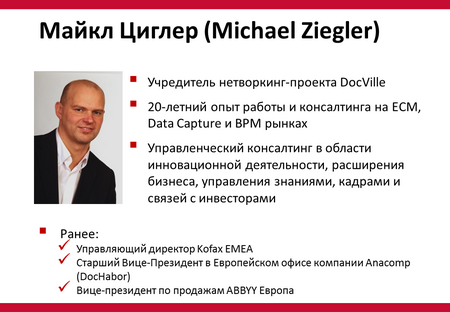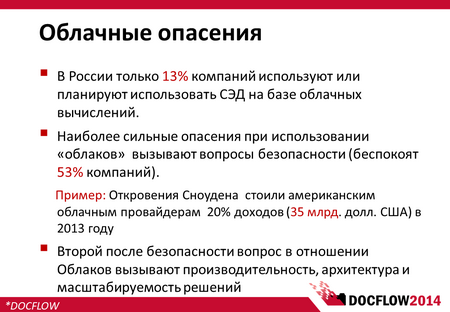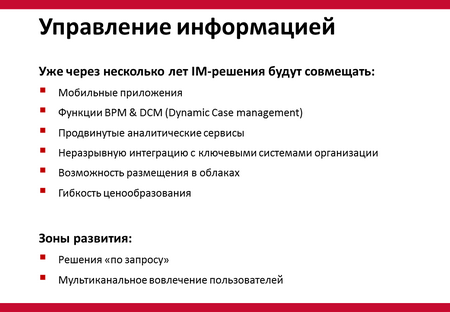The future of the ECM systems market: a view from Europe
- Transfer
 At the end of May, a conference on corporate information management DOCFLOW was held in Moscow . Her special guest was an international ECM consultant, Michael Ziegler . Previously, Michael did not share his experience at business events in Russia (this happened only as part of consulting projects), so listening to him was especially interesting.
At the end of May, a conference on corporate information management DOCFLOW was held in Moscow . Her special guest was an international ECM consultant, Michael Ziegler . Previously, Michael did not share his experience at business events in Russia (this happened only as part of consulting projects), so listening to him was especially interesting. We bring to your attention Michael’s interview and his view on the future of the ECM systems market , as well as a video of the recent speech “Data Management: What the Customer Needs to Know Today”.
The main source of secrets of ECM professional Michael Ziegler is not only his twenty years of experience in the ECM-BPM-Capture market, but also the project he foundedDOCVILLE . The project brings together experts from all over Europe to communicate and discuss sensitive ECM issues. This generalized expertise and observations of the professional community, Michael and shared with conference attendees.
Greetings Michael! Today, thanks in large part to the Internet, there has been a sharp increase in the volume of unstructured information. Not surprisingly, many companies now need Big Data processing solutions. What is your forecast for big data management systems for the next 2-3 years? And how can such systems affect vendors and customers in this sector?
Yes, now everyone is talking about big data, and often they mean different things. A lot of new ones were added to the usual data sources - e-mail, fax and paper documents: audio, video, social networks, lists of web pages viewed by users, SMS, GPS, various sensors, RFID, etc. All incoming information is recorded and placed in storage facilities. 99% of this data is not structured, therefore, before processing it is necessary to analyze and interpret it, but using usual methods (for example, using IDR - Intelligent document recognition) it is impossible to do this. I think that we are waiting for the emergence of new technologies for semantic analysis of content (natural language processing), analysis of unstructured information and predictive analytics, which will be built into information management systems.
In addition, it is important to note that companies are paying increasing attention to data processing and information management. A large amount of information is stored in isolated systems (ERP, CRM, ECM, email clients), and each department considers itself the full owner of this data. Great doubt is also caused by the quality of available information. These problems need to be solved so that enterprises can develop a clear information management strategy based on a single technological platform for working with all documents, data, structured and unstructured information.
The ongoing debate over the security of cloud services seems to have only worsened the situation, especially in Europe. “Is my data safe?” Or maybe Big Brother is watching me? ”- this is the main question that arises for clients. In the USA, the real boom of cloud computing, while Europe is lagging behind. What are your forecasts regarding the European market?
Today, the market for cloud services in Europe is about one third of the level of the United States, and the lag in growth will continue. There are several reasons for this. First, cloud computing is based on trust. We believe that current public opinion will interfere with the development of this sphere, at least over the next 2-3 years. Secondly, unlike Europe, the USA is one huge market where the same solution is suitable for many companies. Europe consists of many countries with different cultures and legislative frameworks. In European countries, the processing and confidentiality of information is regulated by a large number of different laws, and their requirements are much more stringent than in the United States.
 In addition, European companies do not want their data to be stored in another European country, because in the case of computer fraud, you will have to go to a court of another state, with different legislation and language. The German government, for example, does not allow its data to be posted abroad. Due to the recent revelations of Edward Snowden, security disputes have flared up with renewed vigor, and the European Union will need a lot of time and energy to make a difference. The European Commission is currently preparing an action plan that should guarantee the security and clarity of contracts governing property rights and the rules for the use and storage of data. If this plan cannot be realized, the European cloud market and European IT companies themselves will continue to lag behind.
In addition, European companies do not want their data to be stored in another European country, because in the case of computer fraud, you will have to go to a court of another state, with different legislation and language. The German government, for example, does not allow its data to be posted abroad. Due to the recent revelations of Edward Snowden, security disputes have flared up with renewed vigor, and the European Union will need a lot of time and energy to make a difference. The European Commission is currently preparing an action plan that should guarantee the security and clarity of contracts governing property rights and the rules for the use and storage of data. If this plan cannot be realized, the European cloud market and European IT companies themselves will continue to lag behind.What, in your opinion, expects suppliers on the market of data entry automation systems, information resource management and business processes over the next 3-5 years?
 We believe that after five years, data entry automation, information resource and business process management systems will cease to be stand-alone products and, together with other information management solutions, will enter the new general concept of “Enterprise Information Management” (EIM). Larger companies will absorb many suppliers, some will disappear altogether, because they will not be able to compete in the market, supplying only one application or working in only one country. Cloud and mobile solutions will benefit: more than 80% of users will work with mobile devices, which are becoming easier and cheaper. Consequently, convenient and simple solutions will prevail in the application market, customer-oriented and adapted to the specific needs of horizontal and vertical industries. Wireless connection will become available everywhere, the world of applications will merge with the world of web services, which will form the prerequisites for the emergence of new lines of services. Web sites will become “smarter”, and during their development they will take into account the peculiarities of perception of the site by the human brain. We will stop talking about big data, as various channels for attracting customers and analytics with instant results will become the norm. At the same time, we will face stricter regulatory requirements for information security, since for cloud services and mobile Internet the risks of various kinds of abuse will remain quite large. The problem of the lack of qualified IT specialists will continue to be relevant. Wireless connection will become available everywhere, the world of applications will merge with the world of web services, which will form the prerequisites for the emergence of new lines of services. Web sites will become “smarter”, and during their development they will take into account the peculiarities of perception of the site by the human brain. We will stop talking about big data, as various channels for attracting customers and analytics with instant results will become the norm. At the same time, we will face stricter regulatory requirements for information security, since for cloud services and mobile Internet the risks of various kinds of abuse will remain quite large. The problem of the lack of qualified IT specialists will continue to be relevant. Wireless connection will become available everywhere, the world of applications will merge with the world of web services, which will form the prerequisites for the emergence of new lines of services. Web sites will become “smarter”, and during their development they will take into account the peculiarities of the perception of the site by the human brain. We will stop talking about big data, as various channels for attracting customers and analytics with instant results will become the norm. At the same time, we will face stricter regulatory requirements for information security, since for cloud services and mobile Internet the risks of various kinds of abuse will remain quite large. The problem of the lack of qualified IT specialists will continue to be relevant. which will form the prerequisites for the emergence of new lines of services. Web sites will become “smarter”, and during their development they will take into account the peculiarities of the perception of the site by the human brain. We will stop talking about big data, as various channels for attracting customers and analytics with instant results will become the norm. At the same time, we will face stricter regulatory requirements for information security, since for cloud services and mobile Internet the risks of various kinds of abuse will remain quite large. The problem of the lack of qualified IT specialists will continue to be relevant. which will form the prerequisites for the emergence of new lines of services. Web sites will become “smarter”, and during their development they will take into account the peculiarities of the perception of the site by the human brain. We will stop talking about big data, as various channels for attracting customers and analytics with instant results will become the norm. At the same time, we will face stricter regulatory requirements for information security, since for cloud services and mobile Internet the risks of various kinds of abuse will remain quite large. The problem of the lack of qualified IT specialists will continue to be relevant. because various customer acquisition channels and analytics with instant results will become the norm. At the same time, we will face stricter regulatory requirements for information security, since for cloud services and mobile Internet the risks of various kinds of abuse will remain quite large. The problem of the lack of qualified IT specialists will continue to be relevant. because various customer acquisition channels and analytics with instant results will become the norm. At the same time, we will face stricter regulatory requirements for information security, since for cloud services and mobile Internet the risks of various kinds of abuse will remain quite large. The problem of the lack of qualified IT specialists will continue to be relevant.
We believe that after five years, data entry automation, information resource and business process management systems will cease to be stand-alone products and, together with other information management solutions, will enter the new general concept of “Enterprise Information Management” (EIM). Larger companies will absorb many suppliers, some will disappear altogether, because they will not be able to compete in the market, supplying only one application or working in only one country. Cloud and mobile solutions will benefit: more than 80% of users will work with mobile devices, which are becoming easier and cheaper. Consequently, convenient and simple solutions will prevail in the application market, customer-oriented and adapted to the specific needs of horizontal and vertical industries. Wireless connection will become available everywhere, the world of applications will merge with the world of web services, which will form the prerequisites for the emergence of new lines of services. Web sites will become “smarter”, and during their development they will take into account the peculiarities of perception of the site by the human brain. We will stop talking about big data, as various channels for attracting customers and analytics with instant results will become the norm. At the same time, we will face stricter regulatory requirements for information security, since for cloud services and mobile Internet the risks of various kinds of abuse will remain quite large. The problem of the lack of qualified IT specialists will continue to be relevant. Wireless connection will become available everywhere, the world of applications will merge with the world of web services, which will form the prerequisites for the emergence of new lines of services. Web sites will become “smarter”, and during their development they will take into account the peculiarities of perception of the site by the human brain. We will stop talking about big data, as various channels for attracting customers and analytics with instant results will become the norm. At the same time, we will face stricter regulatory requirements for information security, since for cloud services and mobile Internet the risks of various kinds of abuse will remain quite large. The problem of the lack of qualified IT specialists will continue to be relevant. Wireless connection will become available everywhere, the world of applications will merge with the world of web services, which will form the prerequisites for the emergence of new lines of services. Web sites will become “smarter”, and during their development they will take into account the peculiarities of the perception of the site by the human brain. We will stop talking about big data, as various channels for attracting customers and analytics with instant results will become the norm. At the same time, we will face stricter regulatory requirements for information security, since for cloud services and mobile Internet the risks of various kinds of abuse will remain quite large. The problem of the lack of qualified IT specialists will continue to be relevant. which will form the prerequisites for the emergence of new lines of services. Web sites will become “smarter”, and during their development they will take into account the peculiarities of the perception of the site by the human brain. We will stop talking about big data, as various channels for attracting customers and analytics with instant results will become the norm. At the same time, we will face stricter regulatory requirements for information security, since for cloud services and mobile Internet the risks of various kinds of abuse will remain quite large. The problem of the lack of qualified IT specialists will continue to be relevant. which will form the prerequisites for the emergence of new lines of services. Web sites will become “smarter”, and during their development they will take into account the peculiarities of the perception of the site by the human brain. We will stop talking about big data, as various channels for attracting customers and analytics with instant results will become the norm. At the same time, we will face stricter regulatory requirements for information security, since for cloud services and mobile Internet the risks of various kinds of abuse will remain quite large. The problem of the lack of qualified IT specialists will continue to be relevant. because various customer acquisition channels and analytics with instant results will become the norm. At the same time, we will face stricter regulatory requirements for information security, since for cloud services and mobile Internet the risks of various kinds of abuse will remain quite large. The problem of the lack of qualified IT specialists will continue to be relevant. because various customer acquisition channels and analytics with instant results will become the norm. At the same time, we will face stricter regulatory requirements for information security, since for cloud services and mobile Internet the risks of various kinds of abuse will remain quite large. The problem of the lack of qualified IT specialists will continue to be relevant.Full presentation of the speaker in the conference media library.
Translated by ABBYY Language Services .
